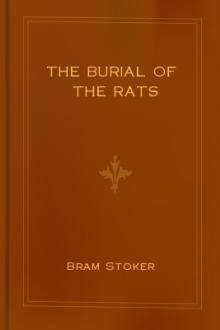The Lady of the Shroud - Bram Stoker (phonics reader txt) 📗

- Author: Bram Stoker
- Performer: -
Book online «The Lady of the Shroud - Bram Stoker (phonics reader txt) 📗». Author Bram Stoker
morning.
I was in my own room, as it is still called. For, though Rupert
tells me in confidence that under his uncle’s will the whole estate
of Vissarion, Castle and all, really belongs to the Voivode, and
though the Voivode has been persuaded to accept the position, he (the
Voivode) will not allow anything to be changed. He will not even
hear a word of my going, or changing my room, or anything. And
Rupert backs him up in it, and Teuta too. So what am I to do but let
the dears have their way?
Well, this morning, when Rupert was with the Voivode at a meeting of
the National Council in the Great Hall, Teuta came to me, and (after
closing the door and bolting it, which surprised me a little) came
and knelt down beside me, and put her face in my lap. I stroked her
beautiful black hair, and said:
“What is it, Teuta darling? Is there any trouble? And why did you
bolt the door? Has anything happened to Rupert?” When she looked up
I saw that her beautiful black eyes, with the stars in them, were
overflowing with tears not yet shed. But she smiled through them,
and the tears did not fall. When I saw her smile my heart was eased,
and I said without thinking: “Thank God, darling, Rupert is all
right.”
“I thank God, too, dear Aunt Janet!” she said softly; and I took her
in my arms and laid her head on my breast.
“Go on, dear,” I said; “tell me what it is that troubles you?” This
time I saw the tears drop, as she lowered her head and hid her face
from me.
“I’m afraid I have deceived you, Aunt Janet, and that you will not—
cannot—forgive me.”
“Lord save you, child!” I said, “there’s nothing that you could do
that I could not and would not forgive. Not that you would ever do
anything base, for that is the only thing that is hard to forgive.
Tell me now what troubles you.”
She looked up in my eyes fearlessly, this time with only the signs of
tears that had been, and said proudly:
“Nothing base, Aunt Janet. My father’s daughter would not willingly
be base. I do not think she could. Moreover, had I ever done
anything base I should not be here, for—for—I should never have
been Rupert’s wife!”
“Then what is it? Tell your old Aunt Janet, dearie.” She answered
me with another question:
“Aunt Janet, do you know who I am, and how I first met Rupert?”
“You are the Voivodin Teuta Vissarion—the daughter of the Voivode—
Or, rather, you were; you are now Mrs. Rupert Sent Leger. For he is
still an Englishman, and a good subject of our noble King.”
“Yes, Aunt Janet,” she said, “I am that, and proud to be it—prouder
than I would be were I my namesake, who was Queen in the old days.
But how and where did I see Rupert first?” I did not know, and
frankly told her so. So she answered her question herself:
“I saw him first in his own room at night.” I knew in my heart that
in whatever she did had been nothing wrong, so I sat silent waiting
for her to go on:
“I was in danger, and in deadly fear. I was afraid I might die—not
that I fear death—and I wanted help and warmth. I was not dressed
as I am now!”
On the instant it came to me how I knew her face, even the first time
I had seen it. I wished to help her out of the embarrassing part of
her confidence, so I said:
“Dearie, I think I know. Tell me, child, will you put on the frock .
. . the dress … costume you wore that night, and let me see you
in it? It is not mere idle curiosity, my child, but something far,
far above such idle folly.”
“Wait for me a minute, Aunt Janet,” she said, as she rose up; “I
shall not be long.” Then she left the room.
In a very few minutes she was back. Her appearance might have
frightened some people, for she was clad only in a shroud. Her feet
were bare, and she walked across the room with the gait of an
empress, and stood before me with her eyes modestly cast down. But
when presently she looked up and caught my eyes, a smile rippled over
her face. She threw herself once more before me on her knees, and
embraced me as she said:
“I was afraid I might frighten you, dear.” I knew I could truthfully
reassure her as to that, so I proceeded to do so:
“Do not worry yourself, my dear. I am not by nature timid. I come
of a fighting stock which has sent out heroes, and I belong to a
family wherein is the gift of Second Sight. Why should we fear? We
know! Moreover, I saw you in that dress before. Teuta, I saw you
and Rupert married!” This time she herself it was that seemed
disconcerted.
“Saw us married! How on earth did you manage to be there?”
“I was not there. My Seeing was long before! Tell me, dear, what
day, or rather what night, was it that you first saw Rupert?” She
answered sadly:
“I do not know. Alas! I lost count of the days as I lay in the tomb
in that dreary Crypt.”
“Was your—your clothing wet that night?” I asked.
“Yes. I had to leave the Crypt, for a great flood was out, and the
church was flooded. I had to seek help—warmth—for I feared I might
die. Oh, I was not, as I have told you, afraid of death. But I had
undertaken a terrible task to which I had pledged myself. It was for
my father’s sake, and the sake of the Land, and I felt that it was a
part of my duty to live. And so I lived on, when death would have
been relief. It was to tell you all about this that I came to your
room to-day. But how did you see me—us—married?”
“Ah, my child!” I answered, “that was before the marriage took place.
The morn after the night that you came in the wet, when, having been
troubled in uncanny dreaming, I came to see if Rupert was a’richt, I
lost remembrance o’ my dreaming, for the floor was all wet, and that
took off my attention. But later, the morn after Rupert used his
fire in his room for the first time, I told him what I had dreamt;
for, lassie, my dear, I saw ye as bride at that weddin’ in fine lace
o’er yer shrood, and orange-flowers and ithers in yer black hair; an’
I saw the stars in yer bonny een—the een I love. But oh, my dear,
when I saw the shrood, and kent what it might mean, I expeckit to see
the worms crawl round yer feet. But do ye ask yer man to tell ye
what I tell’t him that morn. ‘Twill interest ye to know how the
hairt o’ men can learn by dreams. Has he ever tellt ye aught o’
this?”
“No, dear,” she said simply. “I think that perhaps he was afraid
that one or other of us, if not both, might be upset by it if he did.
You see, he did not tell you anything at all of our meeting, though I
am sure that he will be glad when he knows that we both know all
about it, and have told each other everything.”
That was very sweet of her, and very thoughtful in all ways, so I
said that which I thought would please her best—that is, the truth:
“Ah, lassie, that is what a wife should be—what a wife should do.
Rupert is blessed and happy to have his heart in your keeping.”
I knew from the added warmth of her kiss what I had said had pleased
her.
Letter from Ernest Roger Halbard Melton, Humcroft, Salop, to Rupert
Sent Leger, Vissarion, Land of the Blue Mountains.
July 29, 1907.
MY DEAR COUSIN RUPERT,
We have heard such glowing accounts of Vissarion that I am coming out
to see you. As you are yourself now a landowner, you will understand
that my coming is not altogether a pleasure. Indeed, it is a duty
first. When my father dies I shall be head of the family—the family
of which Uncle Roger, to whom we were related, was a member. It is
therefore meet and fitting that I should know something of our family
branches and of their Seats. I am not giving you time for much
warning, so am coming on immediately—in fact, I shall arrive almost
as soon as this letter. But I want to catch you in the middle of
your tricks. I hear that the Blue Mountaineer girls are peaches, so
don’t send them ALL away when you hear I’m coming!
Do send a yacht up to Fiume to meet me. I hear you have all sorts of
craft at Vissarion. The MacSkelpie, I hear, said you received her as
a Queen; so I hope you will do the decent by one of your own flesh
and blood, and the future Head of the House at that. I shan’t bring
much of a retinue with me. I wasn’t made a billionaire by old
Roger, so can only take my modest “man Friday”—whose name is
Jenkinson, and a Cockney at that. So don’t have too much gold lace
and diamond-hilted scimitars about, like a good chap, or else he’ll
want the very worst—his wyges ryzed. That old image Rooke that came
over for Miss McS., and whom by chance I saw at the attorney man’s,
might pilot me down from Fiume. The old gentleman-by-Act-of-Parliament Mr. Bingham Trent (I suppose he has hyphened it by this
time) told me that Miss McS. said he “did her proud” when she went
over under his charge. I shall be at Fiume on the evening of
Wednesday, and shall stay at the Europa, which is, I am told, the
least indecent hotel in the place. So you know where to find me, or
any of your attendant demons can know, in case I am to suffer
“substituted service.”
Your affectionate Cousin,
ERNEST ROGER HALBARD MELTON.
Letter from Admiral Rooke to the Gospodar Rupert.
August 1, 1907.
SIR,
In obedience to your explicit direction that I should meet Mr. Ernest
R. H. Melton at Fiume, and report to you exactly what occurred,
“without keeping anything back,”—as you will remember you said, I
beg to report.
I brought the steam-yacht Trent to Fiume, arriving there on the
morning of Thursday. At 11.30 p.m. I went to meet the train from
St. Peter, due 11.40. It was something late, arriving just as the
clock was beginning to strike midnight. Mr. Melton was on board, and
with him his valet Jenkinson. I am bound to say that he did not seem
very pleased with his journey, and expressed much disappointment at
not seeing Your Honour awaiting him. I explained, as you directed,
that you had to attend with the Voivode Vissarion and the Vladika the
National Council, which met at Plazac, or that otherwise you would
have done yourself the pleasure of coming to meet him. I had, of
course, reserved rooms (the Prince of Wales’s suite), for him at the
Re d’Ungheria, and had waiting the carriage which the proprietor had
provided for the Prince of Wales when he stayed there. Mr. Melton





Comments (0)